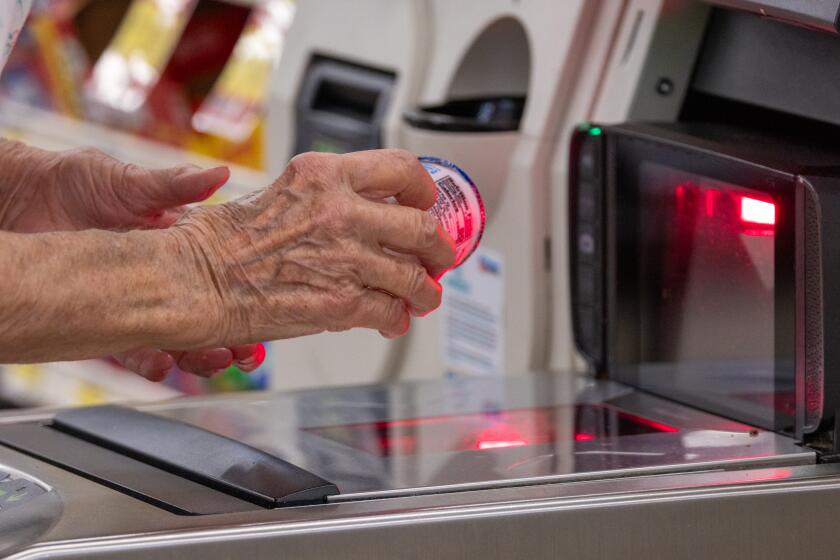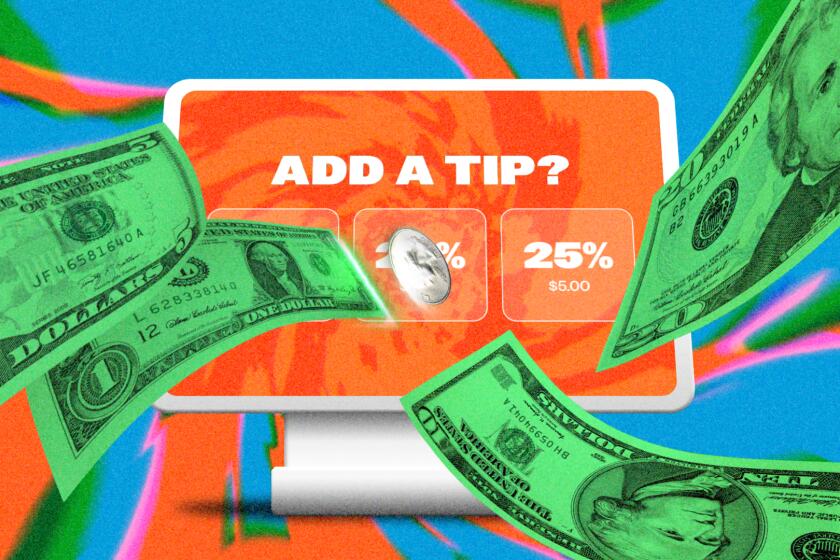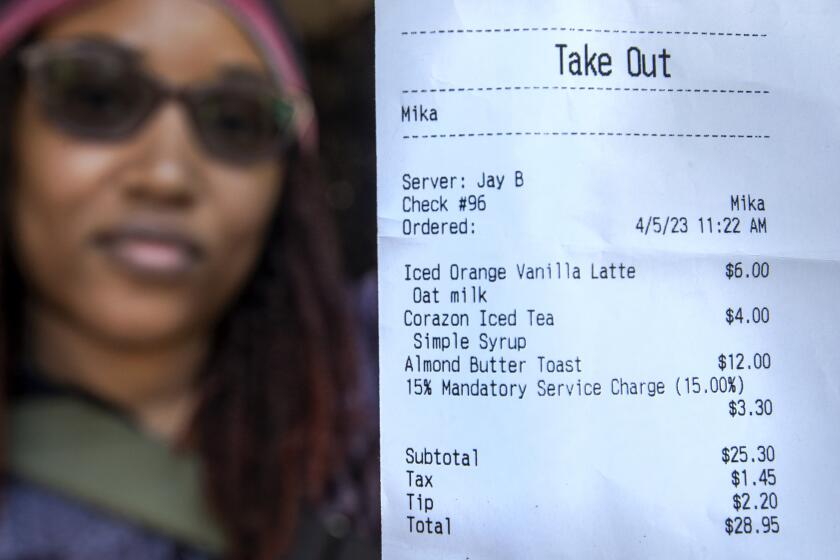Opinion: Tipping culture is out of control. Trump and Harris would make it worse

- Share via
If you left the U.S. for a summer vacation, you may have encountered a strange and refreshing custom: not tipping. Or at least not tipping everyone in sight.
Americans have long been among the world’s most profligate tippers. “We tip more occupations than any other country, and we tend to tip larger amounts than other countries,” says Michael Lynn, a professor of consumer behavior at Cornell University’s School of Hotel Administration whose research focuses on tipping. “We’re kind of the tip-happiest country out there.”
A proposed California bill would limit the number of self-checkout stations an employee must monitor at a given time.
Just wait. American tipping culture is poised to get even more intense. In a rare case of bipartisan agreement, presidential candidates Donald Trump and Kamala Harris both advocate exempting tips from federal income taxes. It’s a popular stance with many potential voters, notably in Nevada, a swing state whose many casino, hotel and restaurant workers rely heavily on tips.
The idea would be bad news for customers — and perhaps even for tipped workers themselves.
The norms around whom, and how much, Americans tip have shifted in recent years — and consumers are increasingly confused.
Consumers are already weary of the way tip expectations have expanded since the pandemic. As people curbed their restaurant dining to avoid COVID-19, they increased the size of the tips they left, whether for dining in, takeout or delivery. Meanwhile businesses gravitated toward machines for cashless, no-contact transactions.
Soon tip jars that once collected loose change at cash registers morphed into touch screens suggesting significantly larger tip amounts, even for small purchases. Restaurants without waiter service — and takeout coffee places — now come with pressure to tip.
A Pew Research Center survey last November found that 72% of U.S. adults believe tipping is expected at more places than five years ago. You have to wonder how often the other 28% get out of the house.
Readers vent about mandatory service charges at restaurants and by solicitations for ever-more generous tipping amounts.
It’s all a bit much. In a February WalletHub survey, three out of four respondents said tipping has gotten out of control. Tipping isn’t just a financial burden. It creates psychological stress. Is a tip optional or expected? How much is enough? Am I a bad person if I say no?
Excluding tips from federal income tax might simplify employer paperwork and erase the difference between easily tracked credit card charges and cash gratuities, which often go unreported. The exemption could also allow employers to pay lower (taxed) wages, because workers would have the hope of keeping more (untaxed) tips.
All of those factors would encourage even more transactions to come with real or virtual tip jars. If your barista, tattoo artist and massage therapist get tips, why not the supermarket cashier, dental hygienist and plumber? Tipping in those situations might seem odd, even unseemly today, but tax-free income is hard to resist.
Vice President Harris has specified that the exemption would apply to “service and hospitality workers,” but they aren’t the only people who currently receive tips. It’s hard to imagine those limits surviving the political pressure to include at least all tipped workers below a given income threshold.
Either way, however, the proposal picks winners. To help all workers in low-paid jobs, presidential candidates might propose increasing the standard deduction or the earned income tax credit. That would be fairer. But the tip loophole isn’t about a general increase in take-home pay; it’s about winning votes in Nevada.
Like the tax credits that oil companies get for blending ethanol with gasoline, thereby subsidizing demand for Iowa corn, making tips tax free offers big benefits to a concentrated group while spreading the costs over the general public. Nobody’s likely to vote against a candidate because they dread proliferating tip jars, but workers who make a lot of tips might vote for them.
If either proposal came to pass, the revenue forgone by the Treasury would have to come from somewhere else. But that would be a “next year” problem, an unpleasant reality not destined to get much attention this fall or sway many votes in November.
That’s why we see two fiercely opposed candidates rushing to agree on this harebrained scheme. We can only hope that they cancel each other out and that whoever is elected drops the idea.
Virginia Postrel is a contributing editor for WorksinProgress.co and writes a newsletter at vpostrel.substack.com. Her most recent book is “The Fabric of Civilization: How Textiles Made the World.”
More to Read
A cure for the common opinion
Get thought-provoking perspectives with our weekly newsletter.
You may occasionally receive promotional content from the Los Angeles Times.













